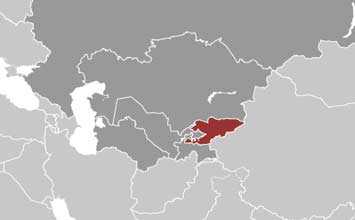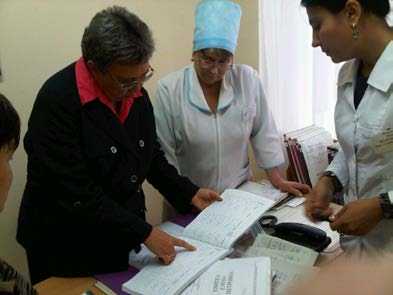
CDC has been collaborating with the Kyrgyz Republic since 1995 to better recognize and respond to serious public health threats. In 1995, CDC established a Central Asia Regional Office in Kazakhstan to coordinate activities throughout the region. In 2011, CDC opened a country office in Kyrgyzstan to strengthen capacity to detect, prevent, and control disease and to respond to public health threats in the country.
Download Overview Fact Sheet
 Staff
Staff
CDC office (physical presence)
No U.S. Assignees
3 Locally Employed
 Kyrgyzstan at a Glance
Kyrgyzstan at a Glance
Population: 5,667,800
Per capita income: $2,200
Life expectancy at birth women/men: 73/65 yrs
Infant mortality rate: 25/1,000 live births
Population Reference Bureau World Population Data Sheet, 2011
 Top 10 Causes of Death
Top 10 Causes of Death
Source: GBD Compare 2010
- Ischemic heart disease 25%
- Stroke 15%
- Cancer 8%
- Lower Respiratory Infections 6%
- Chronic Obstructive Pulmonary Disease 5%
- Cirrhosis 5%
- Road Injuries 3%
- Pre-Term Birth Complications 3%
- Neonatal Encephalitis 2%
- Self-Harm 2%
What CDC Is Doing
- Page last reviewed: March 25, 2014
- Page last updated: March 25, 2014
- Content source:
Global Health
Notice: Linking to a non-federal site does not constitute an endorsement by HHS, CDC or any of its employees of the sponsors or the information and products presented on the site.



 ShareCompartir
ShareCompartir

 Specific prevention activities are designed to implement evidence-based pilot programs to illustrate and test prevention programs, identify and adopt cost effective modes of service delivery, and expand prevention and related services for high-risk populations. Similarly, focus areas for HIV care and treatment services are to build the capacity of clinicians through training and on-the-job mentoring, strengthen HIV and opportunistic infection treatment and care services, develop clinical guidelines for screening and managing HIV infection, and enhance screening for and diagnosis of HIV infection and co-infection.
Specific prevention activities are designed to implement evidence-based pilot programs to illustrate and test prevention programs, identify and adopt cost effective modes of service delivery, and expand prevention and related services for high-risk populations. Similarly, focus areas for HIV care and treatment services are to build the capacity of clinicians through training and on-the-job mentoring, strengthen HIV and opportunistic infection treatment and care services, develop clinical guidelines for screening and managing HIV infection, and enhance screening for and diagnosis of HIV infection and co-infection. The CDC Division of Public Health Systems and Workforce Development (DPHSWD) has been working in Central Asia since 2003 to build workforce capacity and strengthen public health systems. DPHSWD supports the participating countries’ Ministries of Health (MoH) in training public health officers through a two-year Regional Field Epidemiology and Laboratory Training Program (FELTP), located in Almaty, Kazakhstan, that focuses on applied epidemiology, disease surveillance, outbreak response, and program evaluation. While enrolled, residents continue working in their respective country's health system and are well-positioned to serve as first responders to outbreaks, as well as leaders and mentors for future in-country specialists in field epidemiology.
The CDC Division of Public Health Systems and Workforce Development (DPHSWD) has been working in Central Asia since 2003 to build workforce capacity and strengthen public health systems. DPHSWD supports the participating countries’ Ministries of Health (MoH) in training public health officers through a two-year Regional Field Epidemiology and Laboratory Training Program (FELTP), located in Almaty, Kazakhstan, that focuses on applied epidemiology, disease surveillance, outbreak response, and program evaluation. While enrolled, residents continue working in their respective country's health system and are well-positioned to serve as first responders to outbreaks, as well as leaders and mentors for future in-country specialists in field epidemiology.